- Details
![]()
Everyone should have measures in place to protect themselves online. Here are some useful tips:
- Use strong passwords
Passwords should be hard to guess but easy to remember. Some things to consider:- Use long passwords (8-12 characters)
- Use a variety of lower and upper cases, special characters (e.g. $, #, *), and numerals
- Avoid using common names and places.
- Use long passwords (8-12 characters)
- Keep your devices, application software and operating system up to date.
- Secure your home and office Wi-Fi with encryption and a password.
- Install a firewall to stop unwanted internet traffic that may be harmful for your computer.
- Back up your data regularly.
- Do not provide personal or financial information over emails.
- Do not open or respond to emails if you do not know the sender.
- Details
As a customer you will deal mainly with your retailer service provider.
Below is a list of steps that you might take, who to contact, and what might happen.
| Issue | Who to contact | Details |
|
Check eligibility for service |
nbn / retail service provider |
nbn website allows you to check if you are eligible for services. Retail service providers will also be able to advise if you are eligible for services |
|
Purchase a service |
Retail service provider |
Retail service providers sell plans to consumers and small businesses. They will also organise for an nbn technician to connect your premises |
|
Get connected |
Retail service provider |
After purchasing a service with a retail service provider they will arrange for equipment to be installed at your premises. |
|
Delay in getting connected |
Retail service provider |
If the technician missed an appointment or connection is taking longer than expected contact your retail service provider. |
|
Property damage during installation |
nbn |
If the nbn technician caused damage to your property during installation you should contact nbn, who will repair this damage at no charge. |
|
Service does not work after installation |
Retail service provider |
If your service does not work after nbn have installed the equipment contact your retail service provider |
|
Complaint of faulty services |
Retail service provider |
If there are any problems with your connection, such as unusable services, dropouts, delays, slow speeds etc., you should raise the issue with your retail service provider. |
|
Query bill charges |
Retail service provider |
If you experience any unexpected charges you should raise these with your retail service provider. |
|
Service outage |
Retail service provider |
If your service stops working for any reason, contact your retail service provider. |
|
Disconnecting |
Retail service provider |
If you no longer want a Sky Muster service, contact your retail service provider to cancel. |
|
Moving services |
Retail service provider |
If you are moving house, contact your retail service provider about changing your service to different premises. Fees may apply to move a service. |
|
Damaged or moved equipment |
Retail service provider |
If the equipment gets damaged (for example during storms or an object hitting the satellite dish) contact your retail service provider. An nbn technician may be required to visit your premises to correct the position or replace the equipment. There may be a cost, check with your provider. |
|
Complaint about retail provider or nbn not addressing problems encountered |
Telecommunications Industry Ombudsman (TIO) |
If your complaint to your retail service provider or nbn has not been dealt with, contact the TIO. The TIO will refer your complaint to your provider or nbn and give them 10 days to fix your problem. If this does not solve your problem the TIO will work with you and the provider to see if you can agree on how to fix the problem. Finally, if the issue is still not resolved then the TIO can investigate your complaint. |
|
Changing retail service provider |
Retail service provider of choice |
Switching between retail service providers is easy with Sky Muster. Just make sure there are no early termination fees with your current retail service provider. |
|
Think you have seen a scam |
Scam Watch |
Internet scams may attempt to take your money, steal your identity, or access your personal information. If you think you have seen a scam contact Scam Watch. |
How to effectively complain and ensure your rights
- Outline your problem and the outcome that you want to your retail service provider. Ask for a response in a reasonable timeframe (e.g. two weeks). Make a note of all your dealings with your retail service provider for future reference.
- If your issue is not resolved contact the Telecommunications Industry Ombudsman
Where do I get more information?
Contact details:
- ACCC on: 1300 302 502
- Activ8me: 13 22 88
- ANT Communications: 1300 268 266
- BorderNet: 1300 730 302
- Clear Networks: 1300 855 215
- Harbour ISP: 1300 366 169
- IPSTAR: 1800 477827
- nbn: 1800 687 626
- Reach Net: 1800 687 626
- Sky Mesh: 1300 759 637
- TIO: 1800 062 058
Further consumer tips can be found on our website.
- Details

Sky Muster will also be used to deliver services in partnership with educational, community and healthcare service providers.
For example, educational services will be delivered in partnership with State and Territory Departments of Education. The process for connecting will differ depending on the body delivering the service.
My child receives distance education, what service will they receive and when?
Premises with geographically isolated children who receive distance education and are in Sky Muster designated areas, may be eligible to receive a second service to their premises which offers an additional 50GB per month per student (up to 150GB for 3 students - special arrangements may be made for sites with more than 3 students).
Your RSP will be able to verify the process required to place an application. Arrangements are on a state and territory basis.
There are currently four providers offering education services over Sky Muster. You can choose between two speed tiers (12/1Mbps and 25/5Mbps) and port options (all children's education through the same port or different ports).
Is this available for other education services, such as university?
No, educational services will only be available to distance education school children.
- Details
![]() You should report all problems to your retail service provider in the first instance.
You should report all problems to your retail service provider in the first instance.
What if the service stops working?
You should report any service problems to your retail service provider, who will investigate the cause of the problem. Retail service providers should endeavour to repair all faults in a reasonable timeframe.
Who is responsible for services; nbn or the service provider?
The retail service provider is responsible for the service that they deliver to you under the contract that you agreed to.
What if I don’t get the speeds and performance that I was expecting?
There are a number of factors that may affect your service.
If you exceeded your data allowance then your retail service provider may slow your service, usually to 128kbps.
You should contact your retail service provider if the performance is below expectation. Outline the service issues that you are having and how it is not meeting your expectations. If they are unable to improve your service you can take your complaint to the Telecommunications Industry Ombudsman (1800 062 058).
Is there equipment that I can purchase that will improve my experience of the service?
There are a number of products, such as specialised satellite boosters to routers, which claim to improve the performance of the service and reduce data consumption for satellite connections.
These can be very costly and may offer little to no improvement. You should check your performance with your retail service provider before making expensive purchases. There may be other solutions to improve performance issues you are experiencing.
What if the dish or wiring gets damaged?
The satellite dish and related equipment up to and including the modem remains the property of nbn. If damage occurs immediately contact your retail service provider. An nbn technician may visit your premises if any damages occur. If the damage was caused by you then you may have to pay for the repair. If damage is caused by weather events, then you might be able to recover the costs from your home and contents insurance. It is recommedned that the nbn equipment is listed on your insurance policy.
What are my consumer rights?
As a consumer you have a number of rights under the Australian Consumer Law. In particular your retail service provider must:
- provide clear and accurate information in advertising, contracts and bills
- give you help if you’re having problems paying bills and take steps before disconnecting your service
- provide good service and deal quickly with complaints
- provide a repair, replacement, refund, compensation or cancellation, depending on the circumstances.
If your retail service provider is unable to fix performance issues you can raise your complaint with the Telecommunications Industry Ombudsman.

CHECK!
There may be costs associated with repairing damaged equipment. Ask your retail service provider what costs might apply.
- Details
![]()
Connection will be arranged by your retail service provider after you have ordered and agreed to a service. A standard nbn installation is free of charge. However, retail service providers may charge connection fees for their plans.
Retailers must supply services within a reasonable timeframe under Australian Consumer Law. How long it takes to get connected will depend on your location and retail service provider. Currently, there is a waiting list for connections.
Do I contact nbn about a connection?
No. When you order a plan from a retail service provider they will organise for your connection.
What is the process for getting connected?
There are six easy steps to get connected:
- Choose a retail service provider and plan which suits your needs
- Your chosen provider will inform you if you are eligible and give you an estimated installation date
- nbn will contact you to confirm an installation time and date
- Your can purchase, or you retail service provider can provide you with a router
- The nbn technician will install the equipment (satellite dish, internal and external equipment and the required wiring); this may take a few hours and you will need to be at home.
- Plug your computer or the router into the nbn modem to begin using Sky Muster services
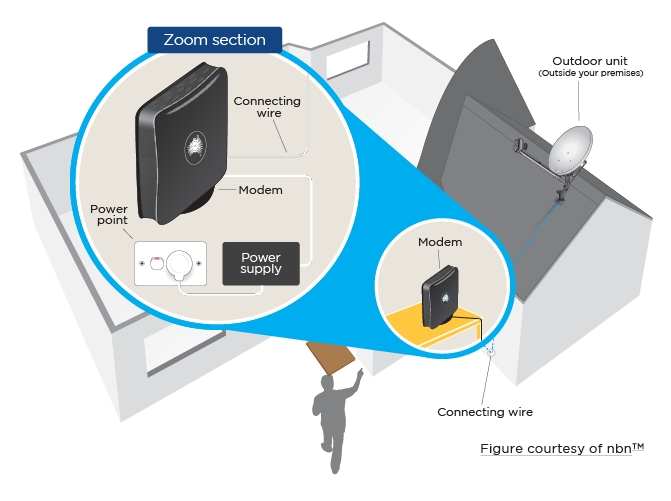
Figure courtesy of nbn
How do I prepare for the installation?
There are a number of things that you can do to prepare.
- Permissions - on installation day the technician will need to ensure that there is permission to carry out the installation. This means that an adult (18+) needs to be home to sign the documents. If you rent the property, permission from the landlord is required.
- Equipment location – you should consider where you want the equipment to be installed. This may require some preparation of the area.
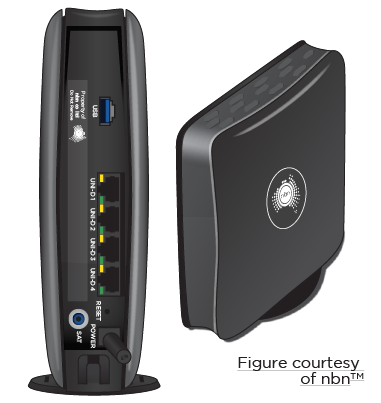
- The satellite dish – this should have clear line of sight of the north sky. The dish may be attached to the roof or the wall of your property.
- Wiring – the satellite dish is connected by wiring to the internal modem
- The internal modem – this is installed inside your premises and needs a power source to work.
- The router – this plugs into the modem and should be located near the place that you will be using the internet connection the most (e.g. home office). The closer the router is to the computers or devices that you use the better the performance is likely to be. Walls, ceilings and floors may affect the signal, especially in some older buildings. Your Wi-Fi signal might have some interference problems if it is located near other appliances or household electronics, such as fridges or microwaves.
- The satellite dish – this should have clear line of sight of the north sky. The dish may be attached to the roof or the wall of your property.
What happens on installation day?
Prior to installation nbn will confirm that the appointment still suits you.
When the nbn technician arrives they will inform you where they are from and show you their I.D.
The nbn technician will then examine your property and recommend the best location for the equipment. They will also confirm any other dishes that require de-installation.
The equipment location should also suit your use of the equipment, so you should clearly explain to the technician where you use the internet in your house to ensure that the location suits you.
Before work commences they will seek your permission to carry out the work.
The technician will then install the equipment. This may take a few hours and you will need to remain on your premises for the duration of the installation. Your property should be left in a good condition.
How big are the satellite dishes?
Most houses will receive the standard satellite dish which is 80cm in diameter. A few houses may need a larger 1.2m dish.
Is there a waiting list available to see how long it takes to get a service before signing up?
No, there is no published waiting list. Your retail service provider can give you an indication of the earliest possible connection date but is not able to guarantee it. nbn will guarantee your installation date once your retail service provider has processed your order.
Can I use my current equipment?
You need a new nbn satellite dish and modem to access Sky Muster.
You may be able to use your current router. Ask your retail service provider about this.
What power is required to run the equipment?
The nbn equipment is powered by 240V AC. If your premises is not connected to the grid ask your retail service provider about a 12/24 V DC option, which may be more suitable.
The router will also require power to function.
What if my house is not a standard installation?
Some properties will be a ‘non- standard installation’. This means that they require a variation to the standard set up. Non-standard installations may incur additional costs.
When the nbn technician assesses your house, they will discuss any variations that are required. At this stage you can cancel your service at no cost if there are additional charges which you were not aware of.

IMPORTANT
Any additional costs will be paid through your retail service provider, not the nbn technician.
nbn technicians will never ask for money and you should never pay them directly.
- Details
![]()
There are a number of options to get voice services:
- You can continue to use your current voice services.
- You may be able to use voice over broadband (called Voice over IP or VoIP) from your retail service provider.

IMPORTANT!
Consumers in satellite areas can continue to use existing phone and internet services (except ISS services).
What is VoIP?
VoIP is a service that uses the internet to make voice calls, instead of the traditional copper connection.
VoIP offered through retail service providers may be of comparable quality to your current voice service. However, you are likely to experience a delay when calling other satellite phones. If you use medical alarms, faxes or are priority assistance then you will not be able to use Sky Muster for these services and should continue to use your current service.
VoIP works by connecting your current telephone to your router. This may require the use of an additional piece of equipment, called an Analogue Telephone Adapter or ATA.
VoIP can also be offered online through over the top providers, such as Skype. They usually work through your computer or devices and use microphone headphones. However, these are not as reliable and you may experience some poor performance.
What costs are associated with VoIP?
Calls are charged in a similar way to your current voice services, but may cost less.
Note: As VoIP uses the broadband connection, making and receiving calls will also use your data allowance. Calls usually use a very small amount of data. However, if you use up all of your data you may no longer be able to make or recieved calls over this service.
Can I contact Triple Zero (000) and 106 Emergency Call Services using VoIP?
A VoIP service from your retail service provider should be able to contact emergency services.
Online VoIP services, such as Skype, are not able to access emergency services.
Can I get priority assistance services?
No. Sky Muster does not offer priority assistance services. You will need to continue to use your current voice services to access priority assistance.
Can I use disability equipment over VoIP?
Disability equipment, such as TTYs may work with Sky Muster. You should check with your retail service provider and ask them to test it to see if the equipment works before arranging disconnection of existing services.
Can I keep my number with a VoIP service?
You may be able to keep your number. Ask your retail service provider.
Will there be a difference in the quality of service between VoIP and my current voice service?
To prevent any loss in performance of voice service you should ask your retail service provider to ensure that Quality of Service settings are enabled across all your equipment.
Satellites are known to experience delay (latency) issues. This can impact services such as VoIP. This is likely to affect calls between two satellite phones.
Can I bundle Sky Muster services with my current voice service?
Yes, some providers are offering a bundle of current voice services with Sky Muster broadband.
Can I just get a VoIP service and not a broadband plan?
No, you have to purchase a broadband plan in order to get a VoIP service.

IMPORTANT!
VoIP services will not work in power outages.
Consider what alternative arrangements you need in case of power outages.
- Details
It is important to pick a plan that matches your needs. Consider what services you are currently using and what you want your broadband plan to deliver.
You should make sure that all the services you want will work over Sky Muster. Some may not work and you may need to keep an existing telecommunications service. Check with your retail service provider if you are unsure.

IMPORTANT!
Services will not work in power outages.
Consider what alternative arrangements you need in case of power outages.
The key things to look out for in a plan:
Speeds
There are two speed levels that you can choose from;
- 12 (down) /1 (up) Mbps and
- 25 (down) /5 (up) Mbps.
What are download and upload speeds?
Speed is a measurement of the amount of data that can be sent to and from you in a second.
The quoted levels are the maximum speed that is achievable for the connection. Speed levels are not consistent and they often vary. The actual speed that you receive will vary depending on a number of factors, such as the type of information you are sending, the time of day, the number of applications sending and receiving files on your devices, your retail service provider and the number of other customers using the service.
For further information on performance, check out our information.
TIPS ON PICKING A SPEED TIER THAT SUITS YOUIf you download sizeable amounts of information (for example high definition movies or gaming), then the faster speed will likely mean that you are waiting less time for this information to be received.
If you only need the internet to access information that is small in size (for example basic websites, emails, individual songs, telephone calls), then the entry speed level might suit you perfectly.
If you are sending lots of files (for example if you operate a small business that updates websites or regularly sends important documents), then fast upload speeds are important for you.
EXAMPLE
The following graphic gives an estimate in the difference higher speeds might make for an activity. These times are estimates and may be affected by other factors, such as other people being online.
Downloading a standard definition movie (1.5GB)
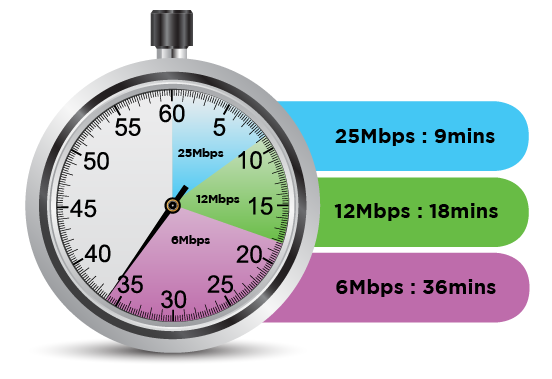
Data
There are a number of plans available, offering allowances up to 150GB per month, divided into peak and off peak usage.
Note that both sent and received data (i.e. uploads and downloads) is counted in the allowance.
TIPS FOR PICKING A DATA ALLOWANCE THAT SUITS YOUHow much data you need depends on what you do and how long you spend online.
You should examine your previous bills to see how much data you have used for the last few months as a basis to calculate how much data you will need.
Checking email and browsing the internet uses very little data, watching videos uses sizeable data amounts, while gaming can quickly use up a lot of data.
Here are some estimated usages by activity as a guide: [note: 1024MB = 1GB]
Activity
Data usage
Email (100 sent/received without attachments)
2.5MB
Music streaming (3 minutes)
3MB
Radio streaming (10 minutes)
15MB
Email (10 sent/received with attachments)
18MB
General web browsing (30 minutes)
10 - 20MB
YouTube video streaming (5 minutes)
25MB
Audiobook (9 hours)
110MB
Downloading standard definition TV show
(45 minutes)
200MB
Downloading standard definition movie
(2 hours)
1 - 1.5GB
Downloading high definition movie (2 hours)
3 - 4.5GB
Downloading a game (e.g. for Xbox or PS4)
20 - 50GB
The average Australian uses 69GB of data a month (June 2015). Consumers who have an nbn connection tend to use more data, so it may be worthwhile considering a plan with more data than your existing plan. The average nbn user uses 131GB of data a month (June 2016)
Peak / Off peak
Plans divide the data allowance between peak and off peak times. Peak hours are between 7am and 1am at your local time (18 hours of the day). Off peak hours are between 1am and 7am at your local time (6 hours of the day).
Plans that offer data usage in off peak times are often better value for money, but may be at a time that does not suit your needs. Peak hours are likely to be the hours when you most want to use the internet.
Set up, equipment and other fees
Your retail service provider may charge other costs, besides the monthly cost, such as for set-up, equipment (router or Analogue Telephone Adaptor (ATA) for VoIP) or early termination fees. You should carefully check all the possible fees that apply with each plan as they differ with each retail service provider.
Length of contract
Some contracts are available month to month, while others have a minimum duration (such as one or two years). Longer contracts may not have up front equipment and connection fees, but will charge if you terminate the service early.
Better Internet for Regional, Rural and Remote (BIRRR) Group have produced a comparison of the price and inclusions offered by the different providers.
I run a small business from home; will there be special plans available for me?
Sky Muster will serve homes and small businesses. If you require a plan to be used for your business also, contact a retail service provider to discuss your options. Some plans are available to both residentiall and small business consumers. Further options are expected to be released in the future.
What is nbn’s fair usage policy?
nbn has set out a number of limitations on how much data each service can use in any four week period. This is designed to ensure that the service is shared equitably and not degraded for everyone.
Your retail service provider should ensure that you do not breach these conditions. You should discuss any concerns with your retail service provider.
Will I lose my current services?
If you have voice, broadband or alarm services through other fixed line, wireless or satellite services, you will likely be able to continue to use them (excluding nbn ISS services).
How do I track my usage?
Retail service providers allow you to check your data usage and alert you if you are close to using all of your allowance.
If you use all of your allowance your retail service provider is likely to significantly slow your speed until the next billing cycle.
Will the bill from my current service end the same day as my new service?
Perhaps. You should check with your retail service provider when the billing periods will begin for Sky Muster and end for other services. This may depend on whether or not you are switching retail service providers.
IMPORTANT QUESTIONS TO ASK YOUR PROVIDER1. Can I use all my current services with this plan?
2. How long will it take to get connected?
3. What do I need to do to prepare my property for connection?
4. Will my other satellite equipment be uninstalled at the same time?
5. When will the billing start?
6. What speed level will I get on average with this plan during peak and off perk hours?
7. Apart from the monthly charge, what other fees do I need to pay?
8. Do I need to purchase a new router?
9. Can I get VoIP services? Is the router set to ensure quality voice services?
10. How do I access my data tracking service?
11. Will there be any additional charges for connecting or fault repairs?
12. Is my property a standard installation? Can I cancel the service, without charge, if I am not a standard installation?
13. Do you offer service guarantees for fault rectification and outages?
- Details

Currently you can choose from 10 different retail service providers to purchase an NBN Sky Muster or Sky Muster Plus plan. They are:
Will there be a difference in the level of performance between providers?
Yes, providers differ on the level of performance offered depending on the number of customers they have and how much they have invested in their service. It is not expected that each retail service provider will offer the same level of service. Therefore, you should check that the level of service offered matches what you need.
How can I compare providers?
There are a number of sites which you can use to compare retail providers:
- Product Review
- Whirlpool
- For video streaming, Google Video Quality Report
- Details

If you have an Interim Satellite Service (ISS), Australian Broadband Guarantee (ABG) or National Satellite Subsidy (NSS) and are eligible, then you can migrate to Sky Muster.
Some houses with these services may be eligible to receive Fixed Wireless and will be offered this service instead.
nbn will uninstall and remove ISS equipment free of charge. They will also repair any damage left by the ISS equipment. ISS services will be switched off when Sky Muster connections are activated. ISS services are expected to end 28th February 2017.
If you have ABG, NSS or other satellite services the nbn technician can uninstall the equipment for a fee. It is your responsibility to dispose of the equipment.
Consumers with other satellite services, such as offered by IPSTAR or Telstra, may also switch to Sky Muster. Contact your retail service provider regarding your options to end your current service.
What is the process for switching from another satellite service to Sky Muster?
Consumers will follow the same steps as new connections;
- Check eligibility on the nbn website
- Choose a retail service provider and plan that suits your needs
- Get connected
Will my current bill end on the same day as the Sky Muster bill starts?
Perhaps. You should check with your retail service provider when the billing periods will begin for Sky Muster and end for other services (ISS, ABG, and NSS). This may depend on whether or not you are switching retail service providers.
I am currently on ISS. If my installation is delayed or if I wait to switch, will the ISS speed improve as other consumers migrate off?
No. As customers migrate to Sky Muster the capacity of ISS will be reduced, so no increased speeds or data levels are expected on the ISS service.
- Details

Sky Muster satellites were purpose-built to provide a fast broadband connection to Australian homes and businesses, so it is expected to perform to a higher standard than previous satellite services.
With Sky Muster services you will be able to take advantage of a broader range of services available over the internet, such as listening to radio, data voice calls (called Voice over IP or VoIP), tele-health and streaming movies as well as checking email, browsing the internet, banking online, and accessing government websites.
Note: Care must be taken with activities requiring high levels of data to ensure usage caps are not exceeded.
Are there things I will not be able to do?
Due to the distance of the satellite, services which require instant communication may not be as responsive as an earth based network. This time delay is called latency. Activities such as voice calls and online auctions may be affected.
Will Sky Muster work during all weather conditions?
Sky Muster, like all satellite services, is affected by weather conditions. The weather at your house and at the ground station, such as rain, storms, cloud cover and dust may all affect services. nbn has specially designed the dishes to adapt to different circumstances, such as storms. However, you might experience lower performance levels during some weather conditions and there may be periods where the service does not work.
You should be aware of this if Sky Muster is your only source of communication. Alternative options should be considered in cases of emergencies.
Will speeds and performance on Sky Muster be better than previous services?
It is expected that services will perform better and be more reliable. Sky Muster is offering two speed levels: up to 12/1Mbps and 25/5Mbps. This is faster than current satellite services, which offer up to 6Mbps.
- Details

Sky Muster (or nbn’s Long Term Satellite Service) will provide fast broadband coverage to three per cent (or around 400,000) of homes and small businesses across regional and remote Australia and its islands.
Am I eligible for services?
Eligibility to obtain these services can be checked on the nbn website.
Consumers currently using satellite services (such as Interim Satellite Service (ISS), Australian Broadband Guarantee (ABG) or National Satellite Scheme (NSS)) will be able to switch to the Sky Muster service (some consumers may receive other technology such as Fixed Wireless). See ‘Switching from another satellite service’ for more details.
What if my address is not on the nbn website but I think it should be?
You should contact a Retail Service Provider (RSP) and discuss your eligibility with them.
How do satellite broadband services work?
The Sky Muster satellites will provide a connection between customer houses and RSPs. When you request to access information from your house, the request is sent from your satellite dish to the satellite 35,786kms above the equator. The signal then travels to one of nbn’s ground stations which connect to your RSP and finally the internet. Information is then sent back to your device in the reverse direction.
To find out more information on what to expect from Sky Muster services see ‘What to expect from a Sky Muster broadband service’.
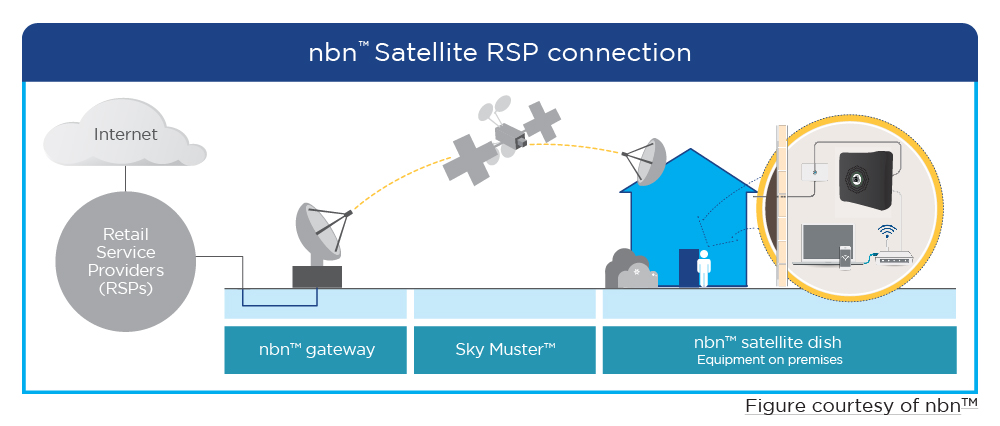
How do I order a service?
Services can be ordered now. To get connected:
- Check if you are eligible (nbn website)
- Choose a retail service provider (see ‘Choosing a retail service provider’) and plan that suits your needs (see ‘Choosing a plan that suits your needs’)
- Get Connected (see 'Getting Connected' for more information).
What services will work over Sky Muster?
Broadband services will work over Sky Muster.
You may be offered other services, such as phone services (called VoIP). See ‘Voice services’ for more details.
Existing phone and internet services delivered over copper, radio and wireless technologies will continue to be offered and you can keep these services.
IMPORTANT QUESTIONS TO CONSIDER AND ASK YOUR PROVIDER
- Can I use all my current services with this plan?
- How long will it take to get connected?
- What do I need to do to prepare my property for connection?
- Will my other satellite equipment be uninstalled at the same time?
- When will the billing start?
- What speed level will I get on average with this plan during peak and off peak hours?
- Apart from the monthly charge, what other fees do I need to pay?
- Do I need to purchase a new router?
- Can I get VoIP services? Is the router set to ensure quality voice services?
- How do I access my data tracking service?
- Will there be any additional charges for connecting or fault repairs?
- Is my property a standard installation? Can I cancel the service, without charge, if I am not a standard installation?
- Do you offer service guarantees for fault rectification and outages?
Will nbn be offering services for children’s education and community use?
Yes. Internet plans are available for distance education children. See ‘Remote and Isolated Communities and Distance Education’ for more information.
What do I do if something goes wrong?
You should contact your RSP if something goes wrong. See 'Interruptions, faults and repairs' for further information on what to do if something goes wrong and 'Who to contact, complaints and further information for contact details.
I am due to get satellite, but I would rather have fixed wireless. What are my options for alternative nbn networks?
If you wish to consider an alternative technology other than satellite, nbn offers a ‘technology choice’ program. There are two possibilities. The first is area switch. This is where a number of properties in an area collectively pay to receive a different technology. The second is individual switch, where one property pays to switch technology.
Both of these options can cost a significant amount of money. Costs range from a few hundred thousand dollars to millions of dollars, depending on the complexity and size of the switch required.
- Details
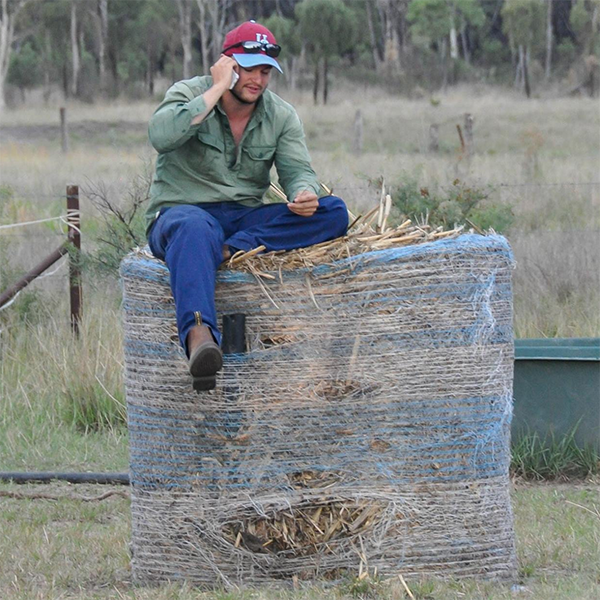 How often do you use the internet each week? Statistics from the Australian Bureau of Statistics released in February 2016 showed that the mean number of hours spent per week on the internet for both males and females is 10 hours.
How often do you use the internet each week? Statistics from the Australian Bureau of Statistics released in February 2016 showed that the mean number of hours spent per week on the internet for both males and females is 10 hours.
Ten hours per week doesn’t seem like much time, but when you think about all of the activities we now do online – accessing education, job opportunities, government services and more – our reliance on the internet becomes very clear.
While some of us may take broadband for granted, there is a growing group of consumers from all over the country who are struggling with poor internet services or even no services at all.
Read more: Facebook group helping rural consumers with internet issues
Write comment (0 Comments)



